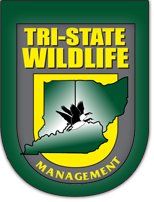To get rid of your yard mole problem sooner rather than later, call the professionals of Tri-State Wildlife Management at (859) 635-0037. Now is a great time of year for garden mole removal in Northern Kentucky. Rid your lawn of moles before freezing temperatures set in! TSWM is fully licensed and insured, and we stand behind our work. Put our experience and expertise to work for you!
Are mole tunnels and mounds ruining your well-manicured lawn? Tri-State Wildlife Management specializes in garden mole removal, and is the answer to your problem! We use the most sound, research-proven techniques for mole management. Put our experience and expertise to work for you!
The greater Cincinnati area is familiar with the eastern mole, which is prevalent from the Atlantic coast to the Great Plains, and from Michigan into Florida.
Moles live underground their entire lives in a network of underground runway tunnels and burrows. Moles are solitary animals, but on occasion their tunnels may intersect with the independent tunnels of another mole. Multiple moles may live underneath the same yard, and sometimes are trapped at the same spot. Moles have both deep tunnels that lead to their denning sites or nesting area, as well as shallow, surface tunnels that are used for feeding. Feeder tunnels may be used once and then left abandoned, while others may be used multiple times. Moles never have runways above ground. Homeowners usually realize they have a mole problem when they see raised grass from underground surface tunnels, or when they see mole mounds. Mole mounds are made when excess dirt is pushed out of the ground as a mole tunnels.
Moles are a nuisance when they occupy a yard because their surface tunnels kill grass and plants, as well as leave unsightly raised ridges in the lawn. Plants and grass die from shallow surface tunnels because the roots are disengaged from the soil. In the warmer months, the plants and grass may die because they no longer have the soil as a source of water. During the winter, roots are surrounded by air pockets from tunneling rather than soil. Plant roots then freeze from the lack of insulation soil provides. Now is the perfect time to rid your yard of moles. When the ground begins to freeze, it is extremely difficult to impossible to set traps to catch them.
Moles continuously dig in search of food, at a rate of eighteen feet per hour, and move forward and backward eighty feet per minute. They eat from 70% to 100% of their weight in earthworms and insects each day to supply the energy for constant tunneling. They prefer to hunt in cool, moist soil, where worms and insects can be found in abundance. Den sites are usually in high, dry ground, although deeper beneath the surface. Moles cover more underground area than most subterranean animals because of their food requirements. During the colder months, and during bouts of hot weather, moles dig deeper beneath the surface. So even during the winter when you may not see new ridges or mounds in your yard, moles continue to be active.
Tri-State Wildlife Management – Protecting You, Your Property, and Your Investment
For Garden Mole Control in Northern Kentucky, call Tri-State Wildlife Management: The Garden Mole Removal Company of Northern Kentucky. (859) 635-0037
Comments are closed.









